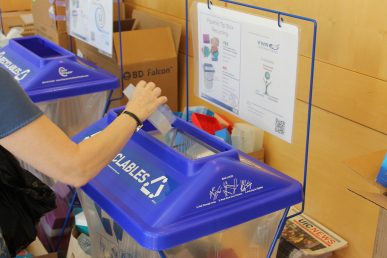Converging on a global waste solution
The University of Illinois at Chicago is part of a team of research universities that will utilize convergence research to address the complex challenge of global waste.
Their proposal, Convergence Around the Circular Economy, received a two-year, $1.3 million award from the National Science Foundation’s new Growing Convergence Research program.
The award has the potential to be extended to five years and $3.6 million.
UIC’s Thomas L. Theis, an investigator on the project, said the global consumption model for any product has, so far, been linear — we take and we make waste — and that we need a better model.
Recycling is not enough, he said.
“We’ve already seen recycling markets break down,” said Theis, director of Institute for Environmental Science and Policy at UIC and professor of civil and materials engineering at the UIC College of Engineering. “Consumption of disposable consumer products has resulted in a global plastic waste stream that increased over 600% since the mid-1970s.”
This linear model, among other things, has resulted in 10 million tons of this waste entering oceans each year, he said.
“This pattern of consumption places enormous pressures on the supply chain and negatively impacts the environment,” Theis said. “We need to shift to a circular economy.”
Rather than focusing solely on creating a better plastic or improving recycling methods, the researchers will seek to develop novel business models, engagement approaches, policy options, and innovative technical and science-based advances that potentially could impact the entire lifecycle of plastics and construction materials.
One approach the researchers will investigate is data tracking via blockchain technology.
Leading the research is the University of Pittsburgh’s Swanson School of Engineering.
“Solving the global waste problem demands a sea-change of thought and accepted practices across so many disciplines and industries, which is why this NSF funding is critical,” said Dr. Melissa Bilec, deputy director of the Mascaro Center, associate professor of civil and environmental engineering, and Roberta A. Luxbacher Faculty Fellow at Pitt, and the award’s principal investigator. “This will require potentially disruptive change, but with a convergence approach we can create a more equitable and sustainable set of solutions that benefit the planet as a whole.”

